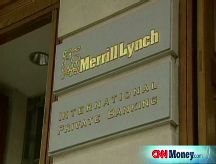Why foreign banks aren't buying
Several high-profile deals show that cross-border mergers aren't dead. But overseas financial firms are avoiding their American peers, and for good reason.
 |
| Unlike in other sectors, foreign banks have shied away from acquiring their American peers out of loan portfolio fears and as they struggle with their own problems. |
NEW YORK (CNNMoney.com) -- More and more foreign companies are scooping up American rivals. But U.S. banks are turning out to be the wallflower at the global merger dance.
The cheap dollar and swoons in the U.S. stock market have spurred some cross-border deals for high-profile companies. Take Belgian-based InBev's successful bid for Anheuser-Busch (BUD, Fortune 500), for example, or plans announced last month by the Swiss drugmaker Roche to take over the remaining shares of the biotech giant Genentech Inc (DNA). that it didn't already own.
American financial institutions, however, aren't getting the same kind of love from their peers around the globe.
"The other sectors are where the deals seem to be getting done," said Bruce Packard, a London-based analyst who covers UK-based banks at broker Pali International.
Even with credit market conditions in miserable shape, cross-border M&A has been booming in recent months.
So far this year, non-U.S. companies have purchased $254.6 billion in U.S. assets, up from $234.3 billion during the same period a year ago, according to figures from Thomson Reuters.
Indeed, some of that has been within the financial services sector. In July, for example, the Japanese insurer Tokio Marine announced it was buying Philadelphia Consolidated Holdings (PHLY) for $4.7 billion in July.
But to a large extent, foreign buyers have avoided gobbling up U.S. financial firms for one simple reason: uncertainty.
The latest quarterly numbers from the U.S. financial services sector suggest that banks and brokers still have plenty of contaminated loans on their books which could continue to fall in value if the housing market and economy deteriorate further.
"It is like a snowball rolling down a hill," said Packard. "It's hard to tell how big the avalanche is going to be in terms of bad debts."
And that uncertainty apparently trumps value.
Regional bank stocks in the United States, as a group, are trading at just 80% of their book value, according to figures from Thomson Baseline. And American savings and loans companies, by comparison, are even cheaper, trading at just 40% of that same measurement. (Book value is a company's assets minus its liabilities and is widely used by analysts as a way to value bank stocks.)
What's more, foreign firms enjoy some of the biggest buying power they've seen in years as the dollar remains near record lows against the British pound and the 15-nation euro. But not even that has been enough to convince European banks to take the risk on an American bank.
"You are not going to buy something with a balance sheet you cannot trust because the currency is 10% to 15% better," said Arturo De Frias, a London-based analyst for Dresdner Kleinwort, who covers European banks including Spain's Banco Santander (STD).
Banco Santander already owns just under a 25% stake in Philadelphia-based Sovereign Bancorp (SOV, Fortune 500) and some analysts have speculated that it could buy the remainder of the bank. Instead, Santander opted to make a bid for the British mortgage lender Alliance & Leicester in July, which makes a purchase of the remainder of Sovereign less likely for now.
Another reason that there haven't been any significant cross-border bank deals lately is that foreign institutions have been awfully busy lately trying to sort out their own affairs.
HSBC (HBC), one of Europe's largest banks, reported Monday that its profits plunged nearly 30% during the first half of the year. HSBC, which already owns banks in the U.S., said that its U.S. operations suffered a $2.9 billion loss.
European banks, as a group, are also suffering through their own capital constraints and face the threat of further deterioration in the European housing market.
As a result, analysts believe that there are few European banks and brokerages that have the wherewithal to start buying American financial firms.
And even in a less severe market climate, cross-border deals are not always easy, experts argue.
Typically, the due diligence process is longer, more complicated and more expensive, given all the obligatory regulatory and tax hurdles to maneuver, notes Samuel Thompson, Jr., professor of law and director of the Center for the Study of Mergers and Acquisitions at Penn State's Dickinson School of Law.
"To do one in the U.S. where you understand the basic laws is one thing. To do it across borders...you are simply compounding the complexity of the transaction," said Thompson.
While that may not prevent a deal altogether, it could serve as yet another item for management to think long and hard about before agreeing to buy a U.S. regional bank, for example.
But history may also serve as a cautionary tale for foreign acquirers.
In recent decades, foreign banks have not enjoyed particular success after attempting to broaden their reach in the United States.
Britain's National Westminster Bank, for example, built up a retail branch network in the Northeast, partly through acquisitions, before getting socked with bad loans during the 1990s when real estate values plunged.
And HSBC is clearly learning that same lesson given the earnings woes it reported Monday.
"Traditionally there has been some caution from European banks' management," said Alex Potter, a European bank analyst at the investment bank Collins Stewart. "As an overseas operator, I may have little reason for believing I can do better than the locals."
If foreign interest in U.S. financials does persist, expect more of what we have seen so far - investors acquiring equity stakes instead of buying the whole company.
Last week, Temasek Holdings, Singapore's sovereign wealth fund, agreed to buy an additional $3.4 billion in stock from Merrill Lynch (MER, Fortune 500), in addition to the $4.4 billion it bought from the brokerage last December. And the U.K.-based Toscafund revealed Thursday that it has passive stakes in the thrifts Washington Mutual (WM, Fortune 500) and Sovereign Bancorp. ![]()



